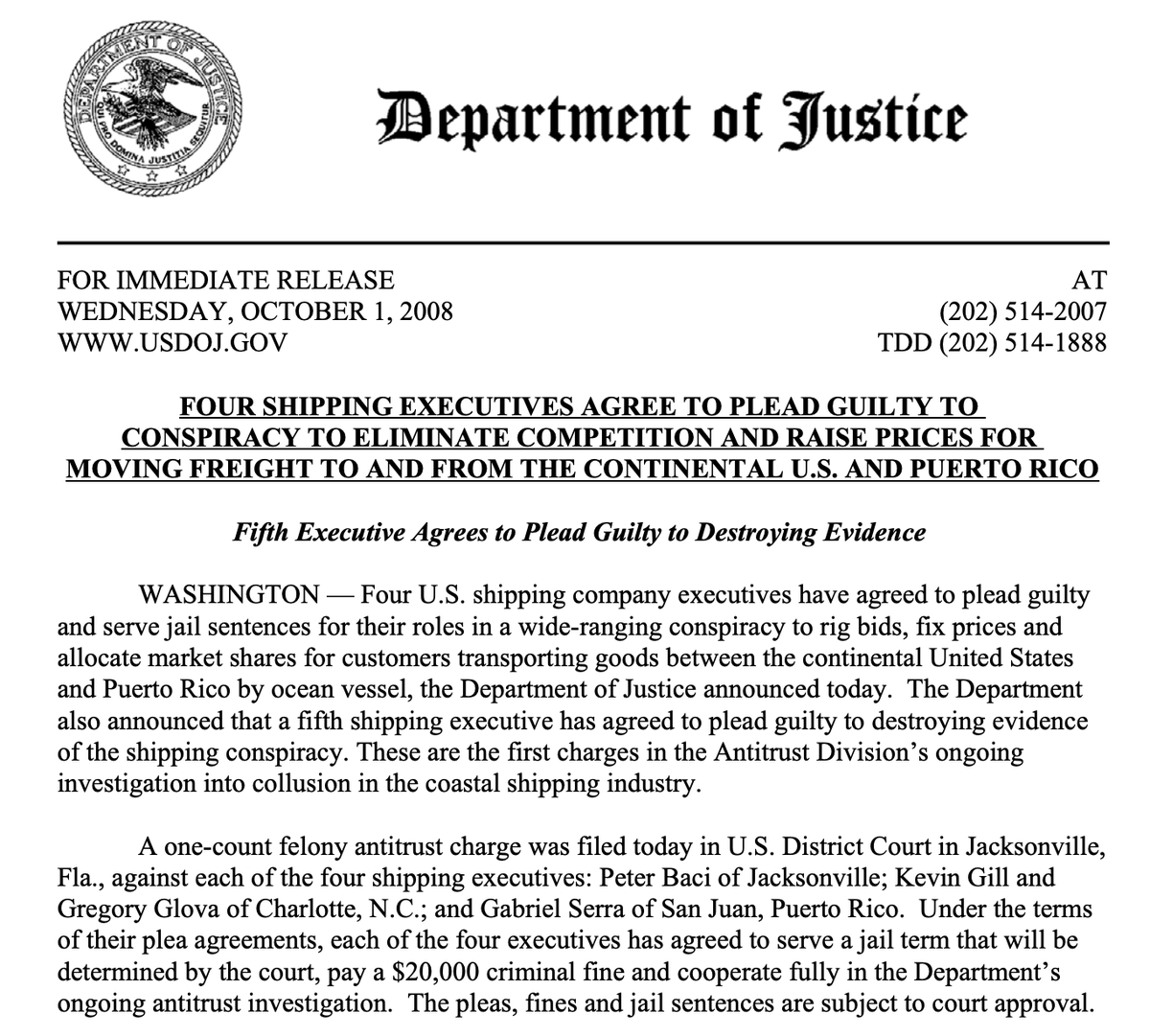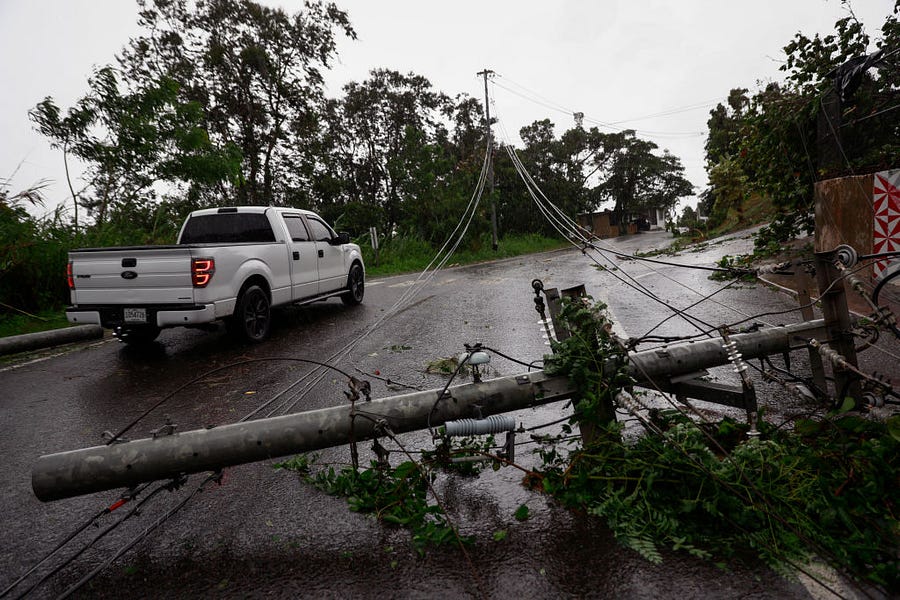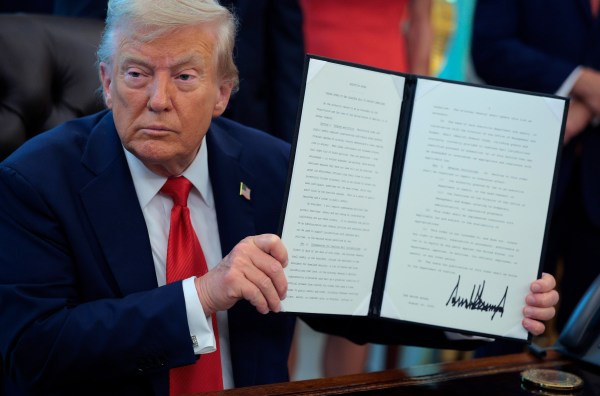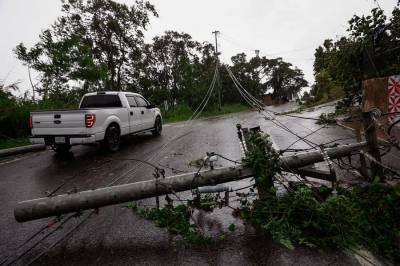Dear Capitolisters,
Imagine one day you turn on the TV news, and the lead story is a major natural disaster in a landlocked U.S. state—say, Arkansas or Vermont—that, simply because of its geography, gets hit regularly. The situation on the ground is bad—the residents of this state are relatively poor and are without power, food, energy, medical supplies, and construction materials. So they’re on TV telling their stories and asking their fellow Americans for help. It’s a common scene, and one that—thanks to our nation’s tremendous generosity in times of national crisis—is usually accompanied by heartwarming private efforts to help U.S. communities in need. In this particular case, however, aid can’t flow freely to this troubled locale because federal law prohibits delivery trucks from servicing the state unless they're made in America, owned by Americans, and operated by Americans. To make matters even worse, there are only a handful of eligible trucks available, only a few eligible points of entry, and no alternate train service to the area. Adding insult to injury, many foreign-made/owned/etc. trucks regularly pass by the state. Yet, by law, they can’t help—even as supplies run low. Unbelievable and outrageous, right?
Well, it’s happening in Puerto Rico right now—in the wake of Hurricane Fiona—thanks to the Jones Act.
I covered the Jones Act and other U.S. maritime “cabotage” laws in a previous newsletter, so go there for the gory details on these laws’ details and national harms. In short:
The Merchant Marine Act of 1920 was presented as a plan to ensure adequate domestic shipbuilding capacity and a ready supply of merchant mariners in times of war or other national emergencies. Section 27 of the law—the “Jones Act”—revised existing U.S. cabotage laws and today restricts the domestic shipping of waterborne goods to vessels that are U.S.-built, U.S.-owned, U.S.-flagged, and U.S.-staffed. As a result of the Jones Act, the United States has one of the most (if not the most) restrictive shipping systems in the world.
As I noted at that time, the Jones Act has—for obvious reasons—particularly acute harms for parts of the United States that rely heavily on waterborne transportation because of their geography. In short, the law grants a small cadre of Jones Act carriers an effective monopoly on bulk shipping to these places, thus reducing supply and increasing prices of food, energy, and most other bulk commodities and consumer staples. While other U.S. locations have transportation alternatives, particularly trucks and trains, these places don’t, and air transport is prohibitively costly for most goods. So, while the Jones Act harms us all, our fellow Americans in these places suffer a lot more.
And there’s nothing they can do about it.
A Brief History of the Jones Act Screwing Puerto Rico
As detailed in my Cato colleague Colin Grabow’s recent Twitter thread, Puerto Rico’s abusive relationship with U.S. shipping restrictions dates back more than a century. Indeed, just days after the December 1898 Treaty of Paris handed over control of Puerto Rico from Spain to the United States, Congress introduced legislation subjecting it to U.S. cabotage law—a move the New York Times then called a “blunder” of “colossal” proportions because “there are no American ships” to serve the distant island. Recognizing this problem, President William McKinley (yes, the one of tariff fame) soon after issued an executive order allowing foreign vessels to temporarily engage in coastwise trade between Puerto Rico and other U.S. ports—one of the earliest signs of how cabotage restrictions impose distinct economic harms on American locales disconnected from the mainland. There would be plenty more to come. Nevertheless, and despite repeated pleas from various Puerto Rican officials, the restrictions were soon reapplied to the island and have remained in place—including when the Jones Act was enacted in 1920.
As Grabow details, the law has been causing problems for Puerto Rico ever since, hindering its economic development throughout the 20th century and uniting Puerto Ricans in opposition. “There is no single problem of greater economic consequence to the people of Puerto Rico than the problem which you have determined to investigate and remedy: the deepening crisis of our offshore shipping services," Puerto Rico Gov. Luis Muñoz Marín told Congress in 1961. In pleading for an exemption from the Jones Act three decades later, Puerto Rico's Resident Commissioner Antonio J. Colorado told Congress that “Puerto Rico is currently carrying a disproportionate share of the burden of the transportation costs associated with financing the merchant marine. This represents an additional cost of 5 percent of all goods purchased in Puerto Rico.”
As numerous studies have documented, these harms continue through today:
According to the 2007 book, The Economy of Puerto Rico: Restoring Growth, the Jones Act is “the equivalent of a tariff on Puerto Rican imports from the United States and on U.S. imports from Puerto Rico.”
A 2012 New York Federal Reserve report on Puerto Rico's economy estimated that Jones Act shipping rates for Puerto Rico cost about twice as much as similar ships to neighboring islands. A 2015 report from International Monetary Fund economists echoed these findings.
Several studies have also concluded that the Jones Act is a major impediment to improving the island’s dire economic situation (and thus have recommended that it be scrapped).
No wonder, then, that the Jones Act‐exempt U.S. Virgin Islands, a U.S. territory next door to Puerto Rico, have fought past congressional efforts to apply the Jones Act there. It’s a costly arrangement for a U.S. island.
The Jones Act produces other problems beyond simply higher prices for goods coming from the United States. For starters, there just aren’t a lot of ships available to service the island: According to Grabow, only four companies—TOTE Maritime, National Shipping of America, Trailer Bridge, and Crowley Maritime—provide regular service, with Crowley and TOTE having an effective duopoly with about 80 percent of the market between them. This translates to a meager 13 eligible vessels—eight of which are old barges, which carry less stuff and are much slower than big, modern container ships—operating out of only four U.S. ports. New competition is also unlikely: Cheaper foreign ships are obviously barred by law, and the insanely high costs of building new vessels in the United States—thanks, again, to the Jones Act—also restricts the possibility of new and efficient domestic competition. Indeed, the former CEO of Trailer Bridge made exactly this argument in a 2005 interview when explaining why people should invest in his company (emphasis mine):
The Puerto Rico market is covered by legislation known as the Jones Act. This requires freight moving between all US ports including Puerto Rico to move on US flag vessels built in the US and owned by US citizens. So that's a major barrier to entry. It's a key investment consideration when somebody is looking at our company. The Jones Act has been around for 80 years; more than 60 countries have similar laws. It's an absolute legal barrier to foreign operators coming in, and we just don't see that going away. The relatively high cost of building vessels in the US, particularly self-propelled vessels, also acts as an indirect barrier to entry to domestic operators. As a result of that, the vessels in Jones Act markets and, more specifically, in the Puerto Rico lane, are quite old. In fact, a defining characteristic of the Puerto Rico market for our competitors is the age of their vessels. Conversely, Trailer Bridge's vessels are comparatively young, which we feel is an advantage.
So, for any trade with the U.S. mainland, Puerto Rico gets limited competition, fewer vessels, and slower service. And even this meager competition was apparently too intense for the Jones Act carriers servicing Puerto Rico, several of whom were charged with price fixing back in 2008:

But, hey, at least the investors are happy.
Next, Jones Act vessels’ high cost and limited availability pushes Puerto Ricans to buy a disproportionate amount of stuff from foreign countries. As the Congressional Research Service noted in 2017:
Comparing waterborne shipping volumes between 1960 and today, one finds that shipments received from the contiguous United States have increased only slightly, while shipments received from foreign sources have increased tremendously. Hawaii and Puerto Rico now receive more cargo from foreign countries than they do from the U.S. mainland.
The latest data confirm Puerto Rico’s foreign import preference:

This situation not only denies U.S. companies business but also generates some bizarre results (and probably higher prices in Puerto Rico). As I noted last year, for example, Puerto Ricans buy rice from China and jet fuel from Venezuela. In July, in fact, Grabow and our colleague Alfredo Carrillo Obregon showed that Puerto Rico buys the vast majority of liquified natural gas (LNG), fuel oil (used for electricity production), and propane from foreign countries, despite the United States being an energy exporting powerhouse and even as neighboring Dominican Republic buys a lot of U.S. energy. According to the head of Puerto Rico’s Electric Power Authority in 2019, this distorted trade pattern—which energy market experts attribute to the Jones Act—costs the island hundreds of millions of dollars.

Of course, it’s no surprise that Puerto Rico doesn’t import LNG from the United States, since there are a grand total of zero Jones Act-compliant LNG tankers—yet another of the law’s casualties and one that also hurts New England.
These harms are particularly bad for a place like Puerto Rico. Most obviously, higher prices of everyday essentials like energy disproportionately harm poor people on tight budgets, and Puerto Rico has a median household income less than half of the poorest U.S. state, Mississippi:

Furthermore, having a small and fixed number of transportation vessels and ports available to service an isolated region can confound humanitarian responses to natural disasters that require urgent shipments of essential goods. And Puerto Rico, being an island in the Caribbean, is especially susceptible to hurricanes. Thus, for example, when Hurricane Maria devastated the island in 2017, numerous parties requested a blanket presidential waiver of the Jones Act to maximize the number of ships and ports that could deliver U.S. aid and thereby contribute to the humanitarian response. Despite domestic industry attempts to block that waiver, President Trump granted the request (albeit for only 10 days), and 10 foreign ships helped out in response:

This episode was just the latest in a long line of Jones Act waiver requests from Puerto Rican officials, especially following hurricanes (see, e.g., Katrina in 2005 and Sandy in 2013) —itself a testament to how the law not only inhibits disaster response but quietly strangles the island in less urgent times. In short, if Jones Act vessels were up to the task of supplying Puerto Rico, these waivers wouldn’t be needed.
The waiver request history alone should be sufficient for the U.S. government to consider, at the very least, a permanent Jones Act exemption for Puerto Rico and any other U.S. state or territory lacking land access to the contiguous United States. Doing that would not only benefit Puerto Rico’s economy and disaster response, but also provide a bounty of data to let us see what a freer U.S. shipping market would look like, at least for these places, and some of the law’s current costs and distortions. The Jones Act lobby, of course, would hate that; thus, its vigorous opposition to any exemptions or waivers and its lavish spending to protect the law.

In fact, these groups have worked hard to make the Jones Act even stricter, and their spending in 2020 when Congress passed legislation further curtailing the president’s legal authority to issue a blanket Jones Act waiver during times of emergency. In particular, a waiver like the one Trump issued for Maria could be issued back then because it was deemed “necessary in the interest of national defense”—a standard that has ample wiggle room. Now, however, that same waiver would have to me be “necessary in the interest of national defense to address an immediate adverse effect on military operations” (amendment in bold underline)—a standard that would be difficult to apply to a natural disaster or many of the broad waivers that have been issued over the years. The Department of Homeland Security also has waiver authority, but it’s narrower than the one Trump used in 2017.
And that brings us to the present day.
Witnessing the Jones Act’s Harm to Puerto Rico in Real Time
Last week, Hurricane Fiona slammed into Puerto Rico, causing “catastrophic” flooding and cutting power to the entire island. As of this Sunday morning, power remained out for hundreds of thousands of Puerto Ricans, whose generators were also running low on diesel fuel:
In the days since the storm hit, hospitals, supermarkets, businesses and residents have had trouble finding diesel to fuel their generators, forcing some to turn them on for only a few hours a day. Others have seen their generators fail, as what happened to a building in the suburb of Guaynabo, where residents were stranded without elevators in a 27-story building, without water or electricity, until a backup generator was brought in a day later.
Of the 68 hospitals on the main island in the Puerto Rico archipelago, 15 to 20 were still without power and operating on generators on Friday, said Jaime Plá Cortés, president of the Puerto Rico Hospital Association.
Mr. Plá Cortés said that several hospitals installed backup generators after Hurricane Maria, when some had to rely on them for more than five months. But the machines need fuel to run.
We also learned on Sunday that a foreign-flagged tanker with 300,000 barrels of diesel fuel from Texas had just arrived in the Puerto Rican port of Peñuelas. In a sane world, that fuel would face no legal impediments to being immediately offloaded for distribution to the hospitals and other places that need it. In a Jones Act world, however, it just sat there:
Given the island’s clear need for diesel and the Jones Act’s role in blocking this ship from docking, the governor of Puerto Rico on Monday requested a DHS waiver to remove the artificial (legal) barrier, taking to Twitter to plead his case. We also learned that the fuel supplier, BP, had asked DHS for a waiver last week. Yet the ship remained offshore Monday waiting for federal government authorization—even with no Jones Act tankers in the area or heading for the island.
On Tuesday, Puerto Rico’s governor sent a formal letter to President Biden requesting the waiver, explaining therein that, because of heightened demand for generator diesel, “supplies continue to decrease at a higher rate than previously anticipated and shortages have been reported around the island.” Other supplies are on the way, he noted, but those will take time. In the interim, fuel suppliers “have notified us that a temporary waiver to the Jones Act … would allow them to rapidly increase diesel supplies on the island." Puerto Rico’s legislature also unanimously approved a resolution calling on the president to do the same:
As chronicled by the Washington Post Monday night, U.S. lawmakers of both parties, along with many public figures and newspaper editorial boards, have also implored the White House to grant the diesel waiver or provide an even broader one. This has put the president in a telling political bind: “To be the most pro-labor president in history” or “to provide Puerto Rico with whatever it needs to recover from a devastating hurricane.” According to this and a subsequent Post piece from Wednesday morning, the White House claims that the recent change to the law (thanks, again, to heavy domestic industry lobbying) bars the president from issuing a blanket waiver like Trump did in 2017. They’re also saying that, while the president supports a narrow DHS waiver for the idling diesel ship, the agency is still processing the request.
Yet the administration didn’t seem to be such legal sticklers when it came to canceling student loan debt, and two DHS waivers issued last year (under the amended law) took only about a day to process. Puerto Rico’s waiver request has been pending for a week.
As of this morning, DHS still hasn’t granted the waiver.
So, to recap, a U.S. law blocked the immediate delivery of U.S. energy to a hurricane-ravaged U.S. location that desperately needs it. And recent changes to that same U.S. law—lobbied heavily by those enriched by it—prevent our suddenly restrained president from issuing an emergency waiver to allow this energy and other critical supplies to be delivered. Meanwhile, a narrower waiver request has languished for days, even though a similar request for a similar product was granted quickly just last year. Surely, there could be practical or logistical impediments to that diesel fuel getting distributed widely (this is, after all, a relatively poor place that just got hit by a hurricane), but it’s beyond unconscionable that the biggest and most immediate impediment isn’t a lack of infrastructure or whatever but instead American policy.
Summing It All Up
The Jones Act raises the costs of shipping goods between Puerto Rico and the rest of the United States, increases the prices of necessities there, and restricts available suppliers to the island, thus retarding disaster relief. Quantifying these harms is exceedingly difficult—in large part because the Jones Act has employed an almost-total ban on foreign ships serving U.S. ports for more than a century—and surely Puerto Rico has other problems too. But it defies logic to think that the law doesn’t inflict significant damage on the island’s struggling economy. Indeed, higher costs are the point: If Puerto Rico didn’t subsidize U.S. carriers and seafarers via the Jones Act monopoly, then the law wouldn’t be necessary: Puerto Ricans would buy freely from globally competitive U.S. shipping companies in its absence. That they’re so desperate to escape the law, and that the Jones Act lobby spends so much to keep it, tells us all we need to know.
Why the Jones Act remains in place is another lesson in Politics 101. But, still, I can’t help but wonder: if it were Arkansans or Vermonters yet again suffering from this law and begging for relief therefrom, and if it were truck-fulls of diesel idling at their borders, would the law still be in force?
Chart(s) of the Week










Please note that we at The Dispatch hold ourselves, our work, and our commenters to a higher standard than other places on the internet. We welcome comments that foster genuine debate or discussion—including comments critical of us or our work—but responses that include ad hominem attacks on fellow Dispatch members or are intended to stoke fear and anger may be moderated.
With your membership, you only have the ability to comment on The Morning Dispatch articles. Consider upgrading to join the conversation everywhere.